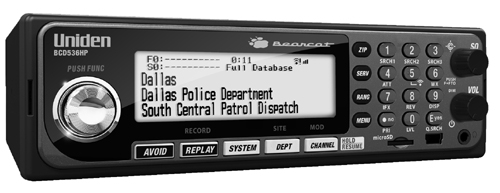 Did you ever wonder how journalists and news agencies learn about breaking stories as they occur? Many newsworthy stories are obtained by journalists monitoring police scanner frequencies using scanner radios. They might learn about a fire at a local apartment complex, a break-in at a local business, or some other type of emergency. Police, fire, public works, and other government services use radio frequencies as a means of communications. These radio frequencies are normally not blocked, so anyone with a radio scanner can access the communications between dispatchers and the responding agencies.
Did you ever wonder how journalists and news agencies learn about breaking stories as they occur? Many newsworthy stories are obtained by journalists monitoring police scanner frequencies using scanner radios. They might learn about a fire at a local apartment complex, a break-in at a local business, or some other type of emergency. Police, fire, public works, and other government services use radio frequencies as a means of communications. These radio frequencies are normally not blocked, so anyone with a radio scanner can access the communications between dispatchers and the responding agencies.
Journalists listening to police scanner frequencies do need to confirm their stories for accuracy before releasing the information to the general public. Not all information is openly shared between dispatchers, police, fire, and other responders over police scanners. More sensitive details about the situation are typically communicated over other secure devices, such as inboard computers and cell phones.
For example, a journalist hears fire and ambulance services were dispatched to the home of the mayor. Unless other details are shared over the scanner radio, they have no other information to report until they can follow up on the story. The only information they could share on the evening news or in the local paper is that emergency responders were dispatched to the mayor’s home. Journalists need to be careful to avoid elaborating further on the story until they have obtained all of the facts.
Is It Beneficial for Journalists to Share Information from Police Scanner Frequencies?
There is some debate as to whether the information obtained from police scanner frequencies should be shared with the general public by journalists. Most local government agencies do not mind if communications are shared with the general public, as long as they are reported correctly without any conjecture. What they expect from journalists, as well as from others using police scanners in their homes, is to be responsible with the information obtained from scanner frequencies. Thanks to modern technologies and the Internet, information is shared at a faster speed today than it was in the past. Journalists and others can post status updates on Facebook, Twitter, and other social media sites, as well as news web pages. Since information is easier to share, accurate reporting is essential in order to avoid creating wide-spread panic in local communities.
In addition to reporting on news pieces, journalists can use scanner radios to report details about weather emergencies, such as major snow storms, tropical storms, severe thunderstorms, and hurricanes. Sharing details about weather emergencies is beneficial for local government agencies. Journalists are able to assist police, fire, and other emergency responders in getting people off of streets, informing them to stay at home or go to their local shelters, as well as to share updates about the weather emergency.
If you are a journalist or want to monitor police frequencies at home, contact us to order your scanner or scanner package today, by calling 1-800-SCANNER (1-800-722-6637).
